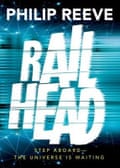Do you plan the whole story out in advance when you write a book? Do you already know how it will end when you start?
I don’t even know the beginning when I start! I just begin writing random scenes, with a vague idea of the sort of book I want, and gradually I start to find out who the characters are going to be, and what’s going to happen. And after many, many re-writes I start to see what the end will be, and I go, “Yippee!” and write my way towards it. It’s quite a laborious process, but it beats working for a living.
Why did you use trains as interspace transport in Railhead? It’s never been done before, has it?
Often in science fiction stories a spaceship travels through a “wormhole” to get from one part of space to another. It seemed to me that if you had wormholes, you wouldn’t need spaceships – you could just run trains through. So it’s actually a pretty obvious idea, once you start thinking along those lines (no railway pun intended…) I’m sure I can’t be the first person to think of it, but that doesn’t really matter; it still seemed like a nice idea to build a world around. I find trains much more interesting than spaceships.
How did you come up with the idea for the Hive Monks in Railhead? I just can’t get them out of my mind!
The Hive Monks are basically walking colonies of insects. I can’t remember where the idea came from – just from thinking about anthills and termite nests, I suppose, and the idea that creatures which aren’t intelligent on their own might have a kind of group intelligence when they formed a colony. The Hive Monks sound scary, but they’re actually quite friendly – the trouble is, nobody wants to be friends with a big bunch of insects! So the Hive Monks try to put humans at their ease by clinging to human-shaped skeletons which they build out of junk, draping robes over themselves, and making faces out of chewed-up paper, like wasps’ nests. Unfortunately that makes them even creepier, but at least they’re making an effort…
When I think of the Station Angels in Railhead, I think of the Weeping Angels in Doctor Who. You wrote one of the Doctor Stories in 12 Doctors, 12 Stories (a brilliant one as well). So are you a Doctor Who fan and does it inspire you?
I don’t follow the modern Dr Who, so I hadn’t thought of that connection. But I used to watch it back in the late 1970s, when Tom Baker was the Doctor. I’m sure it had an influence on the things I’ve gone on to write – but I don’t think Station Angels have anything in common with Weeping ones, apart from the name!
I was lucky enough to receive a proof copy of Railhead. It is a brilliant story with very original and diverse characters. Which character do you relate to the most in Railhead?
Writing a book is a bit like acting in a play, only you get to play all the characters, so you have to sympathise with all of them. There’s probably a bit of me in most of them. Nova is my favourite, but I’m a lot older than her, so I guess I probably have more in common with Malik or Raven.
What is a normal day like for an author and what do you enjoy most?
Some days I just sit at my desk and write – you have to do quite a lot of that, and most of what you write will never find its way into the finished book. I usually try to take a walk in the afternoon, and I carry on writing in my head. I suppose that’s my typical day, but there are lots of other things too, which break up the routine - doing publicity at schools and book festivals, for instance, and answering questions like these. The best bit is when I’m writing and it’s going well!
What was your favourite book growing up and has this influenced your own writing?
People often ask me what’s my favourite book and I can never answer – I have too many now. But when I was growing up it was The Lord of the Rings, and I think you can see how it’s influenced my own writing, because I still enjoy making up detailed imaginary worlds.
If you were a food what would it be and why?
I would be a dark chocolate ginger biscuit: it is the king of biscuits.
I know Warner Brothers have brought the rights to Railhead so there might be a movie coming up! If it happens who would you want to play which characters and why?
I hope they make a film, but I wouldn’t expect to have any say in the casting. And I don’t know much about the current crop of young actors; you’d need someone quite young to play Zen or Nova or Threnody - maybe they should be newcomers, straight out of stage school. There is an actor called Michael Kenneth Williams whose face I sort of had in mind when I started writing the character of Yanvar Malik. (He’s not to be confused with plain Kenneth Williams, that would be a completely different vibe.)
When is the second Railhead book coming out? Is it going to be a sequel or a prequel? How many are there going to be in total?
It will be a sequel, and if I write really, really fast it should be ready for autumn 2016! It would be nice to do three, I think, but I don’t plan too far ahead, and I want to make sure they all work as self-contained books.
Do you have a special writing area? (ie a shed, a study... or what?)
There’s an old garage/workshop in our garden which we’ve had turned into an extra room, and I write in there usually. But if I’m travelling I can write in cafes or on trains – I don’t have to be in a special place!
What’s your guilty pleasure?
I don’t think I have one – I probably should feel guilty about eating too much chocolate, but I don’t!
Are you a perfectionist?
If I was, I’d never publish anything. There comes a point where you have to stop trying to perfect things and just let them go.
What do you think will happen to our planet in the future – do you think it will be anything like the world you have created in Railhead?
I don’t think we’ll have hyperspace railways any time soon! But a lot of things in Railhead are based on things which are already happening – the use of drones, for instance, and the way that nobody has to drive a vehicle or operate a machine – they all run themselves.
Do you plan to illustrate more books or are you going to concentrate on writing? Or a bit of both?
I’ve just illustrated a short retelling of Sir Gawain and the Green Knight which I’ve written for Oxford University Press’s Greatest Stories series. I did it because it would have been my perfect job when I was a student. But I won’t be doing much more illustration. My eyesight isn’t as good as it was, and anyway, I’d rather be writing.
Where do you find “prototypes” for the characters in your book? Are any of them based on real life people you know?
I don’t know if I have “prototypes”. The story needs someone to steal something, so I start writing a thief, and wondering about why he’s a thief and where he comes from, and characters just evolve naturally in that way. Sometimes I might think of a friend, or a particular actor, when I’m working out what someone looks like – but usually they change while I’m writing, and end up quite different.
Do you think we will ever really have robot servants like the ones in Railhead. And if so do you think any of them will ever begin to be conscious and have feelings, as happens in this story? I feel sorry for them!
I think we might, but I don’t suppose they’ll be as human-like as the ones in the book – there isn’t really much reason to make robots humanoid. It’s possible that machines might become conscious – some people think that will happen quite soon, although I’m not so sure. And if they were conscious, I don’t see why they couldn’t have feelings. In fact, maybe they would have to have feelings before they could truly be called intelligent. They might not have the same feelings that we do, though.

Thanks to site members and #Railhead ambassadors FreddyMadeFilms, Minion Potter, The Vampire’s Assistant, Shy Beauty, Page Flicker and TwilightVi for these brilliant questions!
- Philip Reeve’s latest novel Railhead is available from the Guardian bookshop. Philip won the Guardian children’s fiction prize with A Darkling Plain in 2006.
